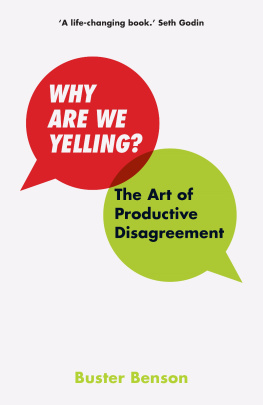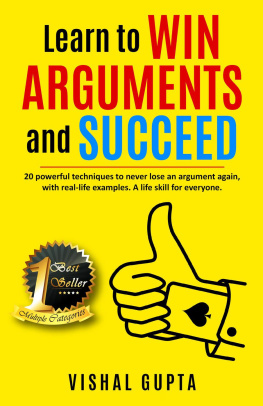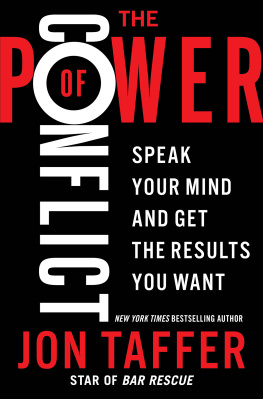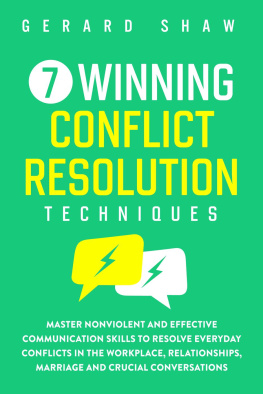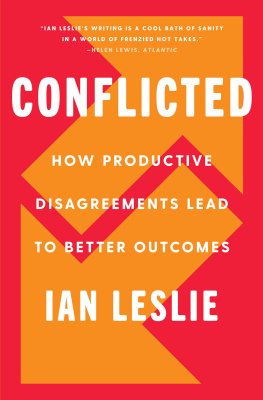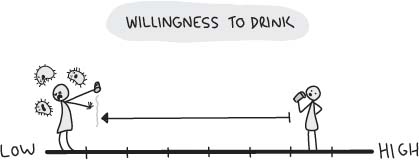Buster Benson is an entrepreneur and a former product leader at Amazon, Twitter, Slack, and Patreon. Hes now a full-time writer for Medium, 750Words.com, and busterbenson.com. This is his first book.
Anxiety is a signpost pointing out our personal beliefs and expectations.
H as this ever happened to you? Youre doing something around the house, and things are a bit chaotic. You grab your lidded coffee cup from earlier in the day off the table and take a big swig. Too late you realize that it must have been an old cup from a week ago that never got thrown away, because you can feel something too horrible to even consider floating in your mouth, and you spit old coffee all over yourself in revulsion. In my defense, this happened to me in college, and Ive never looked at an unidentified coffee cup without suspicion since. Experiences, unlike intellectual arguments, can change your mind about something instantly and forever.
Even if you havent swallowed moldy coffee, that story probably still sparked some disgust and anxiety in you. Most of us have never received guidance about how to interpret these spikes of anxiety, and thus we often dont remember them or assign meaning to them. But we should, because these sparks are the blazing signposts that tell us that something important to us feels threatened. These signposts are unique to our personal histories and, as a whole, represent a map of our personal expectations, hopes, dreams, and disappointments about the world.
COMMON ANXIETY TRIGGERS
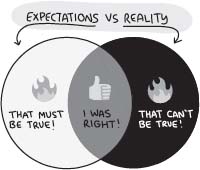
Expectations fall short of reality when:
- Someone says they hate a movie/book/song that you love.
- You put a ton of effort into something that ends up flopping.
- You learn that youre the last person to find out about a shocking family secret.
- Some of your foundational beliefs are challenged in a way you arent prepared for.
- You get caught doing something that you thought youd get away with.
- You cant find a way out of an awkward social situation.
Left unquestioned, each of these sparks of anxiety will dictate how we respond to the world like an invisible program: well misread people, well react incorrectly to new information, and well always revert to trying to forcing the world to change to meet our expectations rather than updating our expectations to better fit the world. Given how little we know and how big the world is, this is almost always a recipe for more anxiety and, ultimately, failure.
AN OLD GLASS OF WATER
One of the first surveys I ran when I was beginning the research that eventually led to this book (and a question I still like to ask people at parties) was about collecting a list of long-running arguments that people have gotten into over and over again. I was looking for the gnarly, twisty, recurring, never-ending arguments, the ones that people repeatedly fell into over the span of yearssometimes decades! These repeating arguments could be with significant others, family members, friends, or just random strangers on the internet. I was especially interested in the ones that seem pretty trivial on the surface but keep coming back again, because something about them taps into deeper emotions and parts of our beliefs and identities. I had a hunch then, and have since confirmed, that arguments live long lives in our heads. Sometimes they stick around for our whole lives, and we practice and refine them with different people at different times. Others are linked to specific relationships, especially with siblings and parents and spouses, and certain topics and perspectives become landmarks to return to over time in these interactions.
One of my favorite arguments came from two good friends of mine, Sharon and Ian. Theyve been married for over ten years and are both lovely, authentic people who are unafraid of tossing around strong opinions. The argument that Sharon shared with me via private message was surprising all the same: Does water go bad when it sits out for a few days? Weve been arguing about this going on about ten years, and still dont agree. PS. Obviously, yes, the water does go bad.
Perhaps because of my old coffee-cup experience from my college days, I had an immediate reaction to this question and emphatically agreed that the water would be completely and unquestionably undrinkable after a few days. Ian, who grew up in Australia and has a more... tolerant relationship to germs, scoffed at us and called us derogatory names. To him, this was just more evidence of how much we had been coddled and possibly ruined by our germophobic culture.
I clarified and opened up the question to a broader group of people to see if it would spark conversation.
Question: If you find a glass of water on your bedside table thats been sitting there three full days, are there good reasons NOT to drink it?

The responses came in fast and ranged across the board. Some of the people who believed the water was okay to drink said things like:
Youre all part of the reason were destroying the planet.
Ive even been known (because Im thirsty or because I hate wasting things) to drink bottled water thats been opened, drunk from (sometimes not by me but by one of my kids), and left in my truck for a week. Ill hesitate more the more uncertain I am of the timeline.
Water left out in a home or office just isnt going to be dangerous or growing any bad bacteria (any more than would be growing on some fruit left on the counter).
And then in the hell-no camp:
No one can change my mind about it. If water has been sitting out overnight, I pour it out and get a fresh one. Every time.
Id choke on all of the dust and particles that have settled in the open glass.
I can always get another one. There is a risk, admittedly very small, of potentially getting sick, so why take the risk, when the act of getting a new glass of water is so little effort?
I am so closed-minded about this it isnt even funny. That water is absolutely stagnant and will kill you within minutes.
The first surprise
I collected a bit more information from each of the people who responded and created this visualization of their responses so we could all look at this important issue together.
Seeing our very visceral reactions and positions in a two-dimensional space helped us appreciate their diversity. It also had the added benefit of making the responses to the question less personal. The little dots on the chart didnt have names or faces attached (mostly because that would have been beyond my skills). When you were looking at the results, it was hard to even remember which dot was your own.
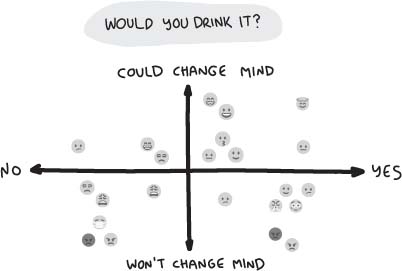
When you depersonalize a position in an argument, it becomes possible to imagine having other positions, in the same way that you might walk around a room and try sitting in different chairs.

